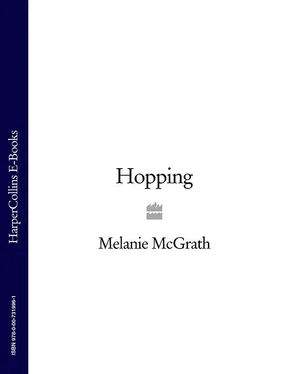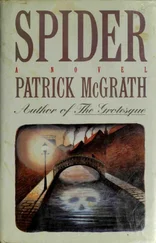Wave that flag, Billy! And give our men a cheer!
And, scowling, Billy would jab the flag in the air and issue a half-hearted hoorah. As they neared London Bridge the number of soldiers increased, and by the time they reached the bridge itself poor Billy was jabbing and cheering like a mad thing. Mrs Shaunessy strode on ahead across the bridge, singing ‘Onward, Christian Soldiers!’
The tide was up and the wide black water tumbled beneath them, but they did not stop to admire the dark cords of lighters bobbing around on the tarry surface, nor the belching little tugs slicing through the currents, nor even the elegant tea clippers that sat outside the London Dock in the Lower Pool, their slender masts lit by the light of paraffin lamps on passing tugs. In all her eleven years, Daisy had never been so far from home. She tried to remind herself that Poplar was just there, just a mile or two downriver, and in a few hours’ time her father would be somewhere on this water, sculling between ship and shore, but she felt frightened and a little homesick and she missed her mother and could not help but feel that she was in some way responsible for everything that had happened.
They reached the end of the bridge and Mrs Shaunessy led the little party along Tooley Street, through a set of immense yellow columns and into London Bridge Station. Inside, they were greeted by a great hoot of noise, a bluster of men and women and a whorl of pearly smoke. Everywhere there were women and children dragging carts and boxes or standing beside towers of cheap cardboard suitcases, some singing, others shouting instructions to the porters, but everyone seemed good-spirited and happy and for now, at least, Daisy was reassured.
Mrs Shaunessy collected her charges together beside a large crudely painted sign, reading Hoppers’ Specials! , and with three fingers pointing to, respectively, the High, Central and Low Levels.
Now , she said, me and Billy is going to run along and get the tickets so you stay there. Don’t you move none and don’t speak to no strangers .
Daisy felt a sly, hard pinch on her arm. She moved over very slightly and stamped on Billy’s foot. The boy shot her an evil look and bit his lip, but said nothing and moved off with his mother, limping slightly.
Ever since she’d known them, which was all her life, Mrs Shaunessy’s family had gone hop picking in the late summer. Mrs Shaunessy said the fresh air and exercise were good for children, and the space and time apart were good for husbands and wives. There was nothing like the freedom that you felt on a long evening with the fires burning and someone striking up a song, she said, knowing that the next day there would be no step to whiten, no coal to heave, no blacking of the range, no boiling laundry or wiping smuts from windows that would be smutty again twenty minutes later.
Most of the Crommelins’ neighbours went to the hop. In fact, almost everyone Daisy knew, including Lilly, had at least one hopper in the family. Daisy didn’t know why the Crommelins had never been. Her mother had once said she thought it was common, so perhaps that was it. Perhaps it had something to do with her mother’s poor health.
The Shaunessys returned in a flash, Mrs Shaunessy carrying two slips of paper, and they soon found themselves on a long platform beside which stood an immense, sooty train. Daisy and Franny heard them coughing along the railway tracks at Poplar, but they had never seen one so close and looking so huge. Mrs Shaunessy parked her hop cart and began looking up and down the platform, then she turned to Daisy and said:
When I say to get on the train you do it and sharpish. Not a second early, not a second late. Billy here will help me with the pram .
She leaned down into the pram again and, pretending to fluster with the baby blanket, whispered:
And not one tiny word from you, miss, not a bleep or a toot. Babies go free and for now you’re one of them, or your father will be paying the price of your ticket .
Soon a whistle blew and Mrs Shaunessy lunged forward. Elbowing several women out of the way, she swung open the door of the carriage and hissed, Now! Billy, for whom this was an annual routine, leapt to the top of the steps, and helped his mother yank and heave the hop box on to the train, then did the same again for the pram.
They took up a bench in the middle of one of the emptier carriages. Mrs Shaunessy parked the pram beside her so that the hood was facing outwards into the corridor and Franny’s face was obscured. Not long afterwards the train hooted and began to lurch from the station.
Now Daisy, ducky , Mrs Shaunessy said, laying her overcoat and a blanket on the bench and spreading her skirts across it, you just creep under here and don’t make no noise . She lifted the coverings. And don’t you come out a second before I tell you to, or you’ll be bringing a whole heartful of trouble down on me. No noise, mind, quiet as mice .
Under Mrs Shaunessy’s overcoat and skirts it was dark and foisty and the prevailing smell of damp and mothballs was so penetrating that for a while Daisy felt as though she might be sick. The train gathered speed, some minutes passed, then she became conscious of a man’s voice asking for tickets, after which there was some hasty movement of Mrs Shaunessy’s skirts and she heard Mrs Shaunessy saying:
Only me and the boy, mister, plus the babe there, but she goes free , now, don’t she?
Eventually, she became accustomed to the cloying whiff and the warmth and the gentle tick-tocking of the train did their work and she remembered nothing more of the journey until she was pinched awake by Billy Shaunessy and, surfacing, saw to her astonishment that they had left the world she knew and had entered a new and strange one. The sun was rising but instead of the dun glimmer that signalled the start of the day in Poplar, everything was bathed in the colours of silk freesias. All along the carriage women and children were gazing from the windows and a hushed silence had fallen of the sort Daisy usually associated with the moment her mother put hot food on the table. She clambered to the window and took her place at it.
At first she saw only a blur of unfamiliar shapes within which she could discern no building, no factory, no street or row of shops, no market or press of people. When she tried to focus on a single object outside the train it raced away from her. Gradually she began to pick out gentle slopes, wooded knolls and copses, and stands of trees. Between the trees, she could see now, the great green swell was divided here and there by little green walls enclosing streets of gnarly trees or bushes, and dotted inside these walls were cows like the ones she’d once seen at Limehouse dairy. A few lonely-looking buildings, which Daisy took to be factories or poorhouses, were dotted about. Some of these were circular and topped with cones on which sat white dunce’s caps. She remembered with a jolt what Billy had once said about her mother: Me mum says your mum’s jigged in the bonce and got put in a fool hasylum . She wondered whether these, too, were hasylums. The distance to the horizon took her breath away. She hadn’t imagined the world could be so big. Where the sky met the land there was a ribbon of such vivid blue that it reminded Daisy of the turbans of certain Lascar sailors.
Soon, they were passing streets of red-brick houses and the train began to slow and, for an instant, until she saw the sign on the platform, which read Faversham , Daisy thought they were back in London. A great many women and children stepped off the train and there was a short commotion of baggage and shouted instructions before the carriage doors slammed and the engine began to heave itself from the station once more. They hadn’t been going long before there was a loud whoosh of air and they were crossing a bridge with a high embankment painted with pink and yellow flowers, then descending towards a tiny cluster of houses separated by meandering paths banked with hedges. It all looked so empty and old and crooked, Daisy thought, like the pictures on biscuit tins, only without the courting couples.
Читать дальше












